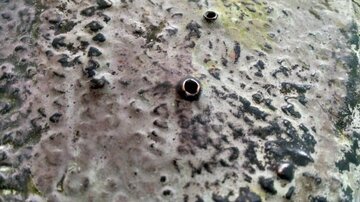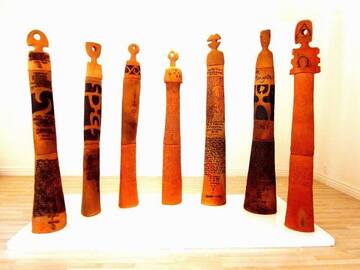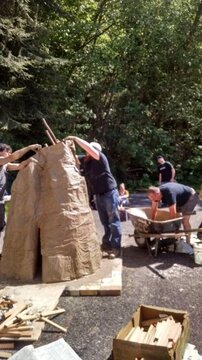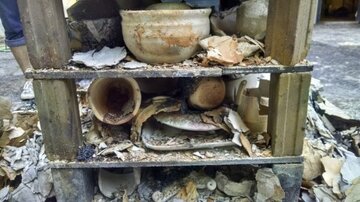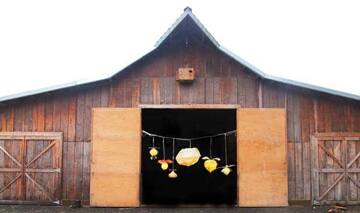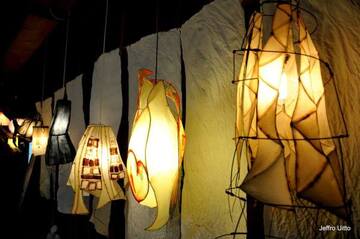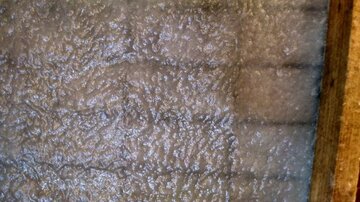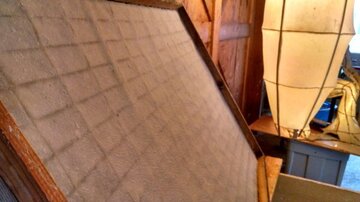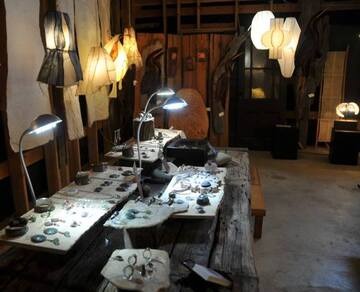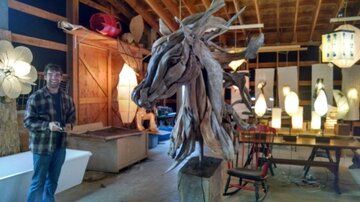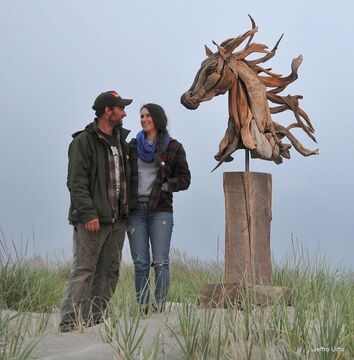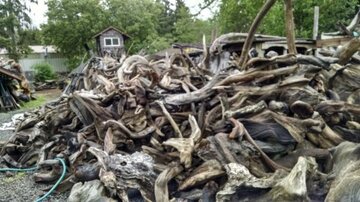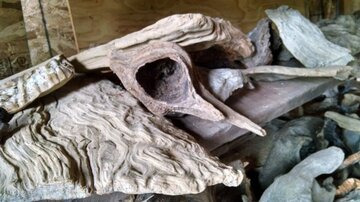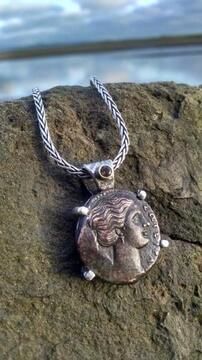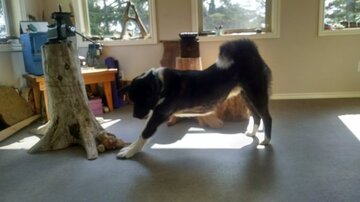MATERIAL ~The Matter from which a things is or can be made.
The dictionary definition of material lists it as a noun or adjective, a name or a description. Used as an adjective, it describes something that is “important, essential and relevant.”
Recently I have been a participant at several art events where the material shines through and guides the process of art making. This post will be about those materials -clay, paper, metal and wood, and show the process by which they are transformed into something new.
Sophia and I attended a cultural exchange workshop in Astoria, Oregon that featured six indigenous Maori clay artists from Aotearoa, New Zealand. The accompanying art exhibit, art lectures, and hands-on clay workshops were called Uku-Aotearoa-The Spirit of Materials.
Artwork by Maori clay artist Baye Riddel
I have not really worked with clay before, except for an ash tray I made in second grade. It was made with coiled rings of clay. It had a green glaze and marbles melted in the center. ( I gave it to my grandfather, who smoked.)
It was a good opportunity for beginners mind, also known Shoshin. This is a concept in Zen Buddhism that refers to having an attitude of openness, eagerness, and lack of preconceptions when studying a subject. Also inspiring was the opportunity to see experienced artists build clay sculptures using age old techniques. There was a grace in watching coils of clay transform into an abstract angel, the artist’s hands building and smoothing every bit of it inside and out. The workroom filled with the energy and camaraderie of students and professionals, each making something with their hands. Maybe it was process that informed the final shape, for some it was an idea wielded and realized through process. The heart beat of it all was the building of a paper kiln. Like paper wasps building a home, the group slathered paper and mud to make a giant hive that breathed fire!
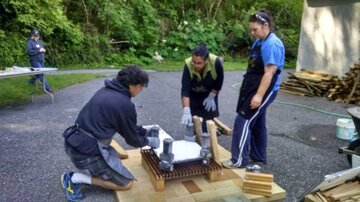 Step one: shelves are assembled to hold ceramics
Step one: shelves are assembled to hold ceramics
This is an ancient, changeable and customizable method of kiln construction. The paper kiln uses simple materials-tree branches, paper and mud to construct an oven around stacked shelves of ceramics. These low-tech, versatile kilns are used in India today.
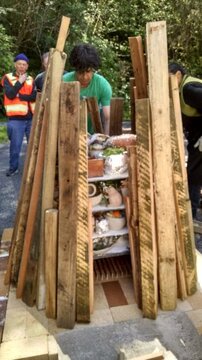 Wood is stacked tipi-style around the shelves.
Wood is stacked tipi-style around the shelves.
Sheets of newspaper are dipped in mud, then wrapped around the frame
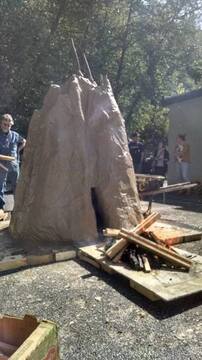 A fire is lit outside the kiln
A fire is lit outside the kiln
The heat is from the fire is drawn into the structure. Coals are shoveled inside and a close watch is kept, repairing the walls as needed and keeping the fire stoked. (It was lit around 4:00 in the afternoon). Flames shot out of the top before it collapsed into itself around 1:00 A.M.
Aftermath-a pile of burned paper, mud and wood coals surround the fired ceramics
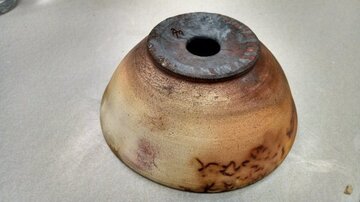 One of the fired pieces-organic material including mosses and shells were attached to the piece with copper netting to produce the random color and markings.
One of the fired pieces-organic material including mosses and shells were attached to the piece with copper netting to produce the random color and markings.
After returning home, steeped and stimulated by what I experienced, I started texturing sheet copper for a wood and metal sculpture collaboration with Jeffo . It feels great to work big-much bigger than jewelry mode. I will share more on our project in a future post.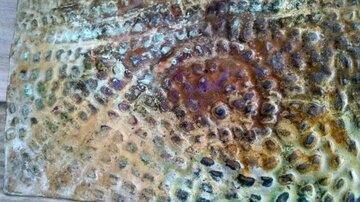
Last week, Jeffro and I showed at the studio/ showroom of HIIH Lights in Astoria, Oregon. Lam Quang and Kestral Gates are a husband and wife team who make handmade paper light sculpture at their wonderful farm.
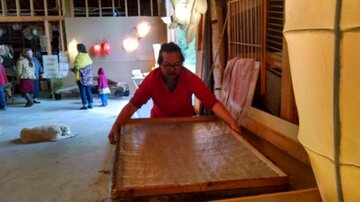 Lam demonstrates paper making…
Lam demonstrates paper making…
Wet mulch drying on the screen
a few hours later, it starts to look like paper.
I need some of their lights for my display!
Jeffro with Arabian Horse Bust, constructed from driftwood with his partner Zela Dove
And more raw materials: piles of small wood that will eventually become part of Jeffro’s art:
“From around the age of six, I had the habit of sketching from life. I became an artist, and from fifty on began producing works that won some reputation, but nothing I did before the age of seventy was worthy of attention. At seventy-three, I began to grasp the structures of birds and beasts, insects and fish, and of the way plants grow. If I go on trying, I will surely understand them still better by the time I am eighty-six, so that by ninety I will have penetrated to their essential nature. At one hundred, I may well have a positively divine understanding of them, while at one hundred and thirty, forty, or more I will have reached the stage where every dot and every stroke I paint will be alive. May Heaven, that grants long life, give me the chance to prove that this is no lie.”
-Hokusai Katsuhika
This quote was hanging on the wall of the ceramics classroom at Clatsop Community College in Astoria. It certainly expands the art and age horizons!
Going to close post with a photo of a recently made pendant, featuring an ancient Greek coin.
Artemeis Solteira. on the beach- ancient bronze coin from Syracuse, Sicily 317 B.C
Until next time-may you be inspired!
